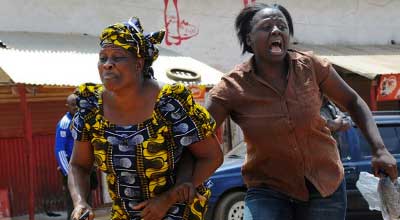Islamic Extremists Attack Another Nigeria Church With Suicide Bombing
Two weeks after a suicide bomb attack by the Islamist sect Boko Haram during a church service in Jos, Nigeria, left at least three Christians dead, a similar blast during a Catholic mass Sunday killed at least three people.
As in the Feb. 26 bomb blast outside the church walls of the Church of Christ in Nigeria service, security personnel action apparently forced the suspected Islamic extremists approaching St. Finbar’s Catholic Church in Rayfield, an affluent area of Jos, to detonate their bomb before their car reached the sanctuary where worship was taking place, eyewitnesses said.
At Jos University Teaching Hospital, 14 people were reportedly receiving treatment for wounds following today’s explosion, which damaged the church’s roof, windows and a portion of a fence surrounding its compound. Others received treatment and were released.
Damian Babang, 26, a parishioner at the church, told Compass that he had just completed a reading during the service when he heard the explosion.
“The next thing I saw was the ceiling of the church falling on us and cries of people struggling to get out of the church,” he said. “Many people are injured, and many have died. I cannot say how many died or injured, but I saw dead bodies being carried away, as well as the injured.”
Babang, visibly traumatized as he spoke inside the church building, said he did not understand why churches have become targets of Muslim terrorists.
Retaliatory attacks by Christian youths reportedly took at least seven other lives Sunday.
The Rev. Emmanuel Kundum told Compass that he had concluded the second mass and left the third service to be conducted by another priest when he heard the explosion at 10:30 a.m.
“On getting outside, I saw members of our church rushing out from the church too. Many were injured and others were dead,” Kundum told Compass.
The priest said he was unsure of the number of people killed, as both the dead and the injured were evacuated to various hospitals in Jos by workers of National Emergency Management Agency (NEMA) and the Red Cross Society. At press time NEMA reported three bodies at the site, but it was not clear if those included the suicide bombers.
“It is very difficult for us to say how many of our parishioners that were either killed or injured,” Kundum said. “NEMA officials removed the dead and the injured to hospitals in the city. We are waiting for them to provide us with the details after calm is restored.”
St. Finbar’s is one of the largest Catholic parishes in Jos, with an average attendance of more than 3,000 worshippers each Sunday.
Jos, often described as a religious fault line between the north and the south, has been the site of numerous large-scale and isolated incidents of violence containing a religious component.
Suspected Islamic extremists detonated a bomb outside a church building in Suleja, Niger state, on Feb. 19, two months after Boko Haram Islamists killed 44 Christians and blinded seven in a Christmas Day church bombing in nearby Madalla. The Feb. 19 blast injured at five Christians.
Nigeria’s population of more than 158.2 million is divided between Christians, who make up 51.3 percent of the population and live mainly in the south, and Muslims, who account for 45 percent of the population and live mainly in the north. The percentages may be less, however, as those practicing indigenous religions may be as high as 10 percent of the total population, according to Operation World.
Boko Haram, the name given to the Islamic extremist group officially called Jama’atu Ahlis Sunna Lidda’awati Wal-Jihad—“The People Committed to the Propagation of the Prophet’s Teachings and Jihad”—seeks to impose a strict version of sharia (Islamic law) on Nigeria. The name Boko Haram translates loosely as “Western education is forbidden.”














































